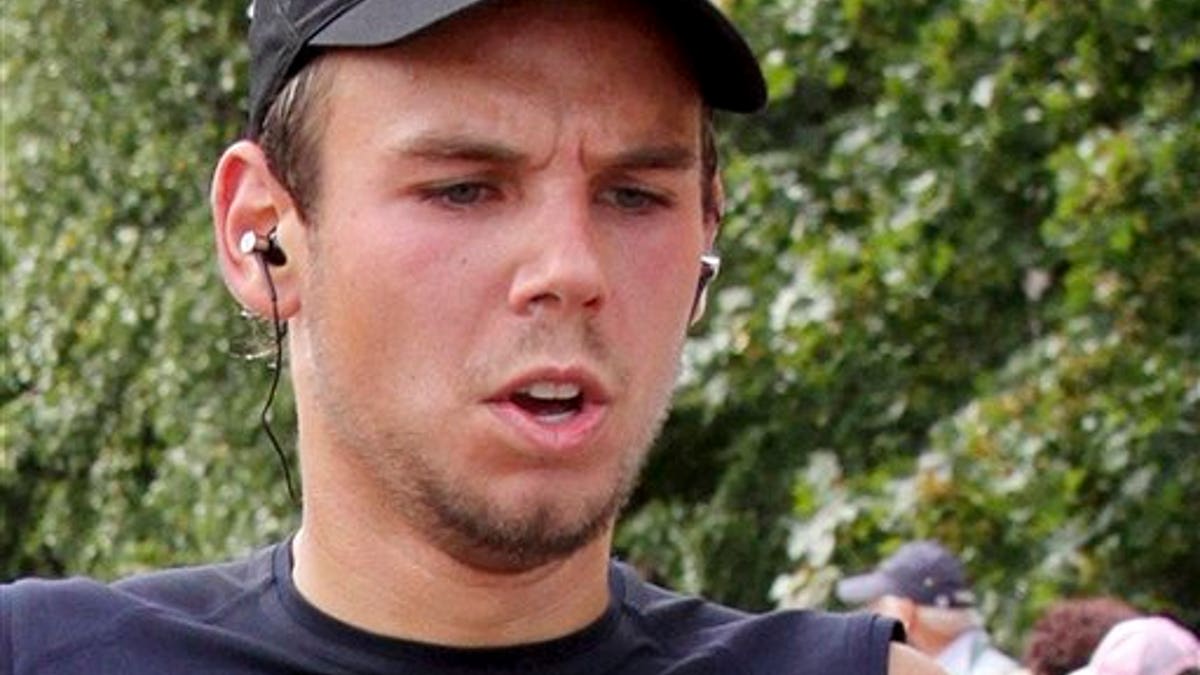
In this Sept. 13, 2009, photo, Germanwings co-pilot Andreas Lubitz competes at the Airportrun in Hamburg, northern Germany. (AP Photo/Michael Mueller)
Whatever else may be said about Andreas Lubitz, the pilot who deliberately crashed his Germanwings jet into the French Alps, killing himself and 149 passengers, he did not lack medical attention: he as under treatment for a good proportion of his relatively short adult life. To judge by the terrible outcome, however, it didn’t do him much good.
Andreas Lubitz was not depressed, he was of bad character, for the improvement of which there is no drug. He was an angry narcissist, murderous at least as much as he was suicidal.
On the contrary: it is even possible, though not provable, that it made him worse. For example, the antidepressants that he was taking might have inclined him to an extremely violent act. Many mass killers have been taking such drugs when they committed their acts, for example Matti Saari, aged 22, who shot and killed 10 students in normally peaceful Finland before also killing himself.
Andreas Lubitz was not depressed, he was of bad character, for the improvement of which there is no drug. He was an angry narcissist, murderous at least as much as he was suicidal.
Of course, a tenth of the population is also taking these drugs, for the most part quite without any benefit to themselves, though with real enough side-effects. The main beneficiaries of such large-scale unnecessary, useless or even harmful prescription, apart from the pharmaceutical companies, are the doctors, who do not know what else to do for their patients.
Depression – for which the treatment, of course, is antidepressants – is now very loosely diagnosed. Patients themselves want the diagnosis: in personally examining about 12,000 people who attempted suicide (with varying degrees of seriousness), not more than a handful ever used the word unhappy to describe themselves to me. They all described themselves instead as depressed.
This is important, because depression is an illness, and the law insists that all illness, whether it be anxiety or depression or cancer or a broken leg, be treated as it were all the same. And it is only natural that people with an illness, depression, should look to their doctors to cure them.
But often they cannot. Andreas Lubitz was not depressed, he was of bad character, for the improvement of which there is no drug. He was an angry narcissist, murderous at least as much as he was suicidal.
Suffering reverses in life, Lubitz sought revenge on what he thought was an unjust world. Many people like him who commit suicide, or try to, imagine a continued shadowy existence after their deaths in which they are able witness the doleful effects that their death has had on others, and they enjoy the prospect. He didn’t want to slip away quietly, he wanted fame, even if it were only notoriety.
If he had killed himself by jumping from a building, say, which requires no more courage than crashing an airplane, no one would have heard of him. By crashing his plane, everyone has heard of him. The 149 people were sacrificed to his wounded vanity and his desire for fame.
I know the type. Once, as a doctor working in a prison, I met a prisoner, an armed robber, whose ambition was to become the most difficult and dangerous man in the whole prison system, thereby achieving fame. What he couldn’t stand was to be unknown. He was intelligent but not sufficiently gifted to earn celebrity in any more constructive fashion. By constantly taking hostages, by fashioning weapons, by constantly increasing his own strength, and so forth, he succeeded in becoming notorious. Better to be hated than anonymous.
Adreas Lubitz was treated as if he were ill, thereby disguising from him his own responsibility for his state of mind.
He was a narcissist whose sorrows and failures made him vengeful and murderous as well as suicidal.
He thirsted for fame, though he had no achievements that entitled him to it, and he was willing to sacrifice 149 others to achieve it. He was prescribed useless drugs that possibly contributed to his aggression. It is a very modern story.
